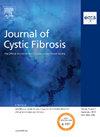靶向核因子κ B (NF-kB)的新型抗炎药GY971的临床前验证
IF 6
2区 医学
Q1 RESPIRATORY SYSTEM
引用次数: 0
摘要
尽管引入了新的CFTR调节剂治疗,但囊性纤维化(CF)的进行性肺损伤和肺部炎症特征仍持续存在。尽管细菌感染和炎症生物标志物显示出改善,但它们并没有完全正常化,这突出了进一步抗炎(AI)策略的必要性。考虑到布洛芬等慢性人工智能治疗会导致胃肠道出血的严重副作用,迫切需要新的抗炎药物。CF炎症的关键介质是NF-kB转录因子,它可以调节促炎基因的表达,如白细胞介素-8 (IL-8),这是CF患者肺部炎症的重要生物标志物(pwCF)。本研究概述了旨在调节NF-kB活性的合成化合物的开发和表征,作为一种新的创新治疗CF的方法。方法在研究的第一阶段,我们重点分析了各种合成衍生物在体外暴露于铜绿假单胞菌(Pa)或tnf - α的CF支气管上皮细胞系和体内Pa肺感染小鼠模型中的作用。结果新的呋喃香豆素衍生物GY971是本次筛选中发现的最佳衍生物,体外和体内均表现出良好的抗炎作用,为进一步研究提供了基础。在我们的第二阶段研究中,GY971的抗炎作用也在pwCF衍生的原代HBE(人支气管上皮细胞)中得到验证,没有任何遗传毒性或光毒性作用。由于这些令人鼓舞的结果,GY971最近被欧洲药品管理局(EMA)批准为CF的孤儿药。我们正在进行的研究旨在巩固其有效性和安全性,使其更接近临床应用,作为CF肺部疾病的创新AI治疗药物。本文章由计算机程序翻译,如有差异,请以英文原文为准。
WS10.06Pre-clinical validation of GY971, a new anti-inflammatory agent targeting Nuclear Factor kappa B (NF-kB)
Objectives
Despite the introduction of novel CFTR modulator treatments, the progressive pulmonary damage and lung inflammation hallmarks of cystic fibrosis (CF) continue to persist. Although bacterial infections and inflammatory biomarkers show improvement, they do not fully normalize, highlighting the need for further anti-inflammatory (AI) strategies. Given the severe side effects of chronic AI therapies, such as ibuprofen, which can cause gastrointestinal bleeding, new anti-inflammatory drugs are urgently needed. A key mediator of CF inflammation is the NF-kB transcription factor, which can regulate the expression of pro-inflammatory genes, such as interleukin-8 (IL-8), a significant biomarker of lung inflammation in people with CF (pwCF).
This study outlines the development and characterization of synthetic compounds aimed at modulating the NF-kB activity as a new innovative therapy for CF.
Methods
In the first phase of the research, we focused on the analysis of various synthetic derivatives in CF bronchial epithelial cell lines exposed to Pseudomonas aeruginosa (Pa) or TNF-alpha in vitro and in mouse models of Pa lung infection in vivo.
Results
The new furocoumarin derivative GY971 proved to be the best derivative identified in this screening, and it demonstrated promising anti-inflammatory effects, both in vitro and in vivo, providing a foundation for further investigations. In the second phase of our study, the anti-inflammatory effects of GY971 were also validated in primary HBE (Human Bronchial Epithelial cells) derived from pwCF without any genotoxic or phototoxic effects.
Conclusion
Thanks to the promising results, GY971 was recently approved by the European Medicines Agency (EMA) as an orphan drug for CF. Our ongoing research aims to consolidate its efficacy and safety profile, bringing it closer to clinical application as an innovative AI treatment for CF lung disease.
求助全文
通过发布文献求助,成功后即可免费获取论文全文。
去求助
来源期刊

Journal of Cystic Fibrosis
医学-呼吸系统
CiteScore
10.10
自引率
13.50%
发文量
1361
审稿时长
50 days
期刊介绍:
The Journal of Cystic Fibrosis is the official journal of the European Cystic Fibrosis Society. The journal is devoted to promoting the research and treatment of cystic fibrosis. To this end the journal publishes original scientific articles, editorials, case reports, short communications and other information relevant to cystic fibrosis. The journal also publishes news and articles concerning the activities and policies of the ECFS as well as those of other societies related the ECFS.
 求助内容:
求助内容: 应助结果提醒方式:
应助结果提醒方式:


